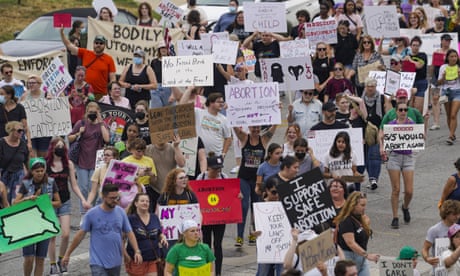- by foxnews
- 04 Apr 2025
Democrats call Indiana’s near-total abortion ban a ‘death sentence’
Democrats call Indiana’s near-total abortion ban a ‘death sentence’
- by theguardian
- 16 Sep 2022
- in news

As Indiana's near-total abortion ban went into effect on Thursday, Democratic lawmakers announced their dismay, referring to the ban as a "death sentence".
The bill, SB 1, contains only extremely narrow exceptions in which abortions may now be performed - with abortions for rape and incest capped at 10 weeks; only to be delivered in hospitals; and limiting the procedure to medical emergencies.
"Hoosier women have lost a fundamental right to privacy in medical decisions with this near total ban, which is extremely cruel," said Representative Sue Errington of the 34th district in Indiana. "I'm old enough to remember before Roe v Wade. And I know that laws like this only ban safe legal abortion. Women are going to suffer, and some will die from this," she said.
Errington, who tried to bring a referendum on abortion in Indiana this year, said the bill was hugely out of step with what Hoosiers want. The Republican party's own polling from late June, before they signed the bill into law, showed most people in Indiana do not support a total ban on abortion.
The ban is being challenged in court by the ACLU and several abortion care providers, with hearings set to start on 19 September.
"The basic right we all believe we possess is to be able to control our bodies and make decisions for ourselves surrounding reproductive issues, without interference from the state," said Ken Falk, of the ACLU. "But what the state is saying here, is, 'we don't care that your pregnancy is going to cause you severe mental harms or physical problems, you just can't have an abortion'."
Indiana lawmakers passed the legislation during a special legislative session in early August, with a six-week pause before it came into effect.
Earlier this week West Virginia followed and also passed a sweeping ban.
The law effectively wipes out abortion access for 1.5 million Hoosiers of reproductive age, and will have far-reaching consequences as Indiana had become a safe haven for those seeking abortion in other nearby states.
Now, residents in places like Wisconsin and Kentucky, which have total or near-total abortion bans in place, will have to travel hundreds of miles for the procedure. Meanwhile, other midwestern states, like Michigan, will put abortion rights directly to the public in a ballot in November.
"The impact is going to be felt suddenly. But its true force is going to be felt over the years to come," said the Indiana state senator Shelli Yoder. "We continue to hear from healthcare providers that they are second-guessing whether or not they should practice in Indiana because the way the law is written, it puts their profession and their license at severe risk."
The Indiana law is an all-encompassing abortion ban with some extreme restrictions. It limits abortions to cases where there is serious risk to the health or life of the pregnant person, and in the case of a lethal fetal anomaly up to 20 weeks post-fertilization.
Similar abortion restrictions in other states have already putlivesat risk, which is of huge concern in Indiana, which has some of the worst maternal and infant mortality rates in the US.
Because of those restrictions, Yoder said she believed the bill was anything but pro-life. "It's totally hypocritical," she said. "You would think that if a state is going to pronounce they are a pro-life, that we would have a support network in place to actually help those living there."
Furthermore, she said exceptions allowing abortions in the case of rape or incest will cause more grief - because of a clause that caps them after 10 weeks of pregnancy.
"This bill says, we are only going to give full constitutional rights to women if their very life is threatened, or they are a victim of rape. Then those women and girls have just 10 weeks to come to terms with the assault, being pregnant by their assaulter, and sorting through that trauma," Yoder said.
Other experts have said parts of that stipulate abortions must be performed in hospitals or surgical centers owned by hospitals are going to have huge knock on effects.
"Historically, in recent years, almost all abortions have taken place in clinics. It's not clear how many hospitals in Indiana will even choose to make abortions available," says Mary Ziegler, a US abortion law expert from the University of California, Davis.
"Many hospitals have religious policies that are opposed to abortion. So requiring all abortions to be performed in this handful of facilities will make it more likely there'll be fewer abortions altogether," she said.
Ziegler says the law is just the latest in a set of attempts by lawmakers to change the national conversation around abortion.
"States that are criminalizing abortion are trying to create a new framework. It's a conscious effort to say, 'we shouldn't be thinking of abortion as healthcare, we should be thinking of abortion as a crime,' she said. "The more people in states hear that kind of argument and see things framed that way by people in power, the more some of them will come to believe it," said Ziegler.
- by foxnews
- descember 09, 2016
'I traveled for an entire year for free - and saved $15K'
Hailey Learmonth explored Australia without paying rent, thanks to pet sitting. She saved $15,000, lived on farms, and embraced remote work to travel on a budget.
read more


